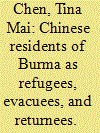| Srl | Item |
| 1 |
ID:
139679


|
|
|
|
|
| Summary/Abstract |
This article analyses how, at the time of the Japanese military expansion across Asia in the 1930s and 1940s, the category of ‘Burma Chinese’ and notions of ‘Chineseness’ acquired meaning through the movement across Chinese and Indian borders of residents of Burma identified as Chinese. Focusing on the terminology utilized by various reporting organizations to refer to evacuees, refugees or returnees, this article asks what we can learn from bureaucratic exchanges and practices of documentation about the wartime migration of Burma Chinese. I argue that a shared racial logic of territorialization operates across divergent sets of correspondence concerned with the repatriation of Burma Chinese to Burma. Multiple acts of iteration and practical implementation of categories naturalized this racial logic with respect to Burma Chinese in the latter half of the 1940s. Understanding how the work of repatriating Burma Chinese rested upon a shared racial logic is important because the regulation of Asian wartime migration was foundational to the emerging international refugee regime and post-Second World War world order.
|
|
|
|
|
|
|
|
|
|
|
|
|
|
|
|
| 2 |
ID:
193734


|
|
|
|
|
| Summary/Abstract |
Previous research on the distributional effects of carbon tax has primarily focused on different income groups, with less examination of different age groups. Nevertheless, significant differences in the effect of carbon tax are expected for different age groups, particularly for the vulnerable elderly. Based on detailed data regarding the consumption patterns, this study first investigates direct and indirect emissions for different age groups of residents. And then we analyze the distributional effects of carbon tax on residents of different ages and income groups using an input–output price model. The results show that the indirect carbon payment burden rate on the elderly (i.e., the proportion of carbon tax expenditure in total expenditure) is 1.2 times that of the general population. The combined impact of income and age on comprehensive indirect carbon payment rates is estimated to be 1.4 times that of the general people, showing that the carbon tax exacerbates the energy poverty of low-income seniors to a greater extent. In addition, supportive measures can effectively reduce the carbon tax cost burden of the elderly and low-income residents. Even if the carbon tax is levied more vigorously, it can still enhance the ability of vulnerable groups to overcome negative energy shocks.
|
|
|
|
|
|
|
|
|
|
|
|
|
|
|
|